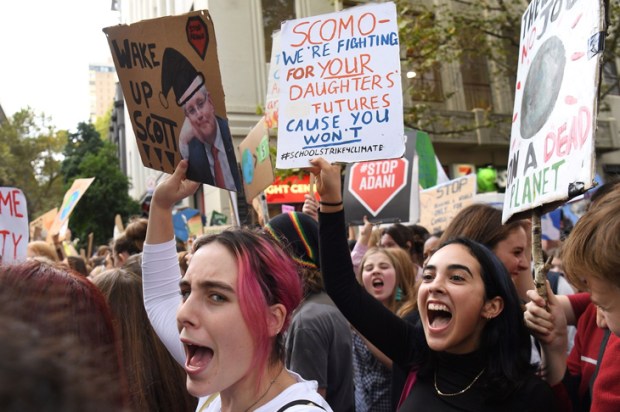On March 3rd the President of the Australian Law Reform Commission (ALRC), Professor Rosalind Croucher, wrote an opinion piece in the Australian commenting upon that body’s recently released report ‘Traditional Rights and Freedoms – Encroachments by Commonwealth Laws’. A fair few people on the side of more free speech (including this magazine’s editor) have interpreted this ALRC report as being a positive step on the road to fixing free speech in this country.
They, and he, are wrong. This is yet another court-centred, international law obsessed report that is more likely to worsen free speech in this country than to fix it. And frankly that is no easy matter to accomplish given the enervated state of free speech in this country as things stand.
Let’s take a look at Professor Coucher’s March 3rd opinion piece. Yes, she talks about the inroads made by Section 18C, singling out only the ‘offends’ component as possibly unjustifiably interfering with freedom of speech. Meanwhile the ALRC and its President ‘recognise the need for racial vilification laws’; they claim that ‘there might be a need for new criminal laws to target the most serious types of racial vilification’; they justify the barely half-hearted attack on 18C’s ‘offends’ provision (and maybe ‘insults’ but certainly not its equally egregious ‘humiliates’ provision) in terms of what is ‘required under international law’. Oh, and then the ALRC President does the usual lawyerly thing and talks about how this one small component of the awful 18C edifice might be vulnerable to attack in the High Court on federalism grounds and the so-called implied freedom of political communication.
To warm the hearts of the 95 per cent of academic human rights and constitutional law academics in this country she even throws in the expected digression that ‘this can complement work that considers other ways to protect rights – such as by creating new causes of action or new offences, or by enacting a bill of rights’. Deep down they all see unelected judges as the real guarantors of free speech and other rights, a nonsense when you look at what in the philosophy of science is known as ‘the facts’, but tediously expected all the same.
Okay, so here’s a quick rebuttal. First off, international law is highly democratically deficient. A long-established democracy such as Australia produces better law than does the kind that emerges from treaties negotiated with Somalia, China, Cuba and so on. And it’s better than the so-called customary international law, which doesn’t have a single, solitary democratic bone in its entire body. Human rights lawyers won’t admit this, but it’s true. There are good grounds for being highly suspicious of international law, and no reasons at all for preferring it to what is produced in our Parliament. Indeed in the Australian’s lead editorial the day after Professor Croucher wrote her piece it was pointed out – rightly pointed out – that one international treaty (the ICCPR) is being used by the Organisation of Islamic Co-operation to push for more censorship on speech and indeed any sort of criticism of Islam at all (as though we should go back a couple of centuries and live with hard-nosed blasphemy laws).
Then there are all the other ridiculous aspects of rights-related international law such as the fact that there have been more UN Human Rights Council (which presently includes Saudi Arabia, Cuba, China, Pakistan, and… you get the idea) and General Assembly resolutions for infringing rights levelled against Israel than against all other countries on earth combined. Or that only Israel deserves censure when it comes to the rights of women. Paying the slightest attention to this sort of international rights-related stuff is an out-and-out joke, unless you’re a lawyer, or a legal academic, or better still the ALRC. (Did I mention that Saudi Arabia was just elected Chair of the UNHRC’s Advisory Council or that there has never once been a single, solitary UNHRC resolution against Saudi Arabia for alleged human rights abuses?)
Or take hate speech laws and bills of rights. My native Canada has a potent and constitutionally entrenched bill of rights with an explicit free speech right. Twice (not once but twice) the Canadian equivalent of our 18C was challenged in the Supreme Court of Canada and twice (not once but twice) the hate speech law was upheld. You know how they got rid of the hate speech law up there? The Canadian Parliament eventually did what a legislature that values free speech ought to do and repealed it. Sound familiar? That’s what this Coalition government promised all of us who voted for it last election that it would do once elected but then shelved in order not to offend ‘Team Australia’.
Be clear. The so-called implied freedom of political communication jurisprudence that Professor Croucher mentioned is highly dubious in terms of its being a plausible and honest interpretation of our Constitution. I doubt very much if there is a bigger proponent of wide scope for free speech working in an Australian law school today, and certainly not one who has written more about the need for it, than I. But I also value highly democracy and democratic decision-making, and I want top judges who interpret what’s in the document, rather than give us what they wish were there. It would be a terrible mistake to have some committee of seven unelected ex-lawyers fix the state of our feeble free speech for us, as though we were children. If you want to live in a free society you don’t throw yourselves in the hands of a bunch of judges. You vote for people who aren’t invertebrates who will show enough backbone to repeal this awful 18C law despite the bleatings and protestations of the usual (as it happens) human rights lawyers and Race Relations Commmissioners on $350,000 of your tax dollars per year, and other Team Australia members.
In Canada it took over 30 years to get it off the statute books. But finally it was done, and it was done the right way – not via lawyers and judges, many of whom have less commitment to free speech than most plumbers, teachers and secretaries to be perfectly blunt. Oh, and since repeal in Canada I haven’t noticed that the heavens have fallen, that hate has proliferated or that any of the other scare-mongering outcomes predicted by the illiberal ‘we support free speech except when it involves speech we don’t like’ brigade.
Personally, I found nothing attractive about Professor Croucher’s article. Not the suggestion we need new laws limiting so-called racial vilification. Not the hope the High Court might do what should happen in a free society through the elected legislature.
Nothing.
Got something to add? Join the discussion and comment below.
Get 10 issues for just $10
Subscribe to The Spectator Australia today for the next 10 magazine issues, plus full online access, for just $10.
You might disagree with half of it, but you’ll enjoy reading all of it. Try your first month for free, then just $2 a week for the remainder of your first year.













Comments
Don't miss out
Join the conversation with other Spectator Australia readers. Subscribe to leave a comment.
SUBSCRIBEAlready a subscriber? Log in